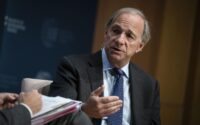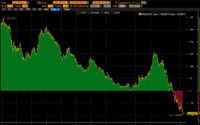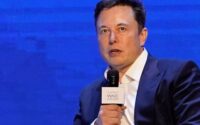ECB to Keep Tightening Rates If Projections Hold: New Economy
(Bloomberg) — The European Central Bank is closely monitoring the situation in financial markets for signs that the economic outlook has shifted after the recent episode of banking stress, according to Governing Council member Pablo Hernandez de Cos.
Most Read from Bloomberg
If there’s no such evidence, another interest-rate increase will be needed to ensure inflation retreats to the ECB’s target of 2%, de Cos, the governor of the Spanish central bank, said in remarks to the Bloomberg New Economy Gateway Europe event near Dublin.
“If the baseline scenario from March prevails in May, this means a further hike will be needed,” he said by video link, adding that how many increases follow and the magnitude of such steps would depend on incoming data.
The Bloomberg Gateway series brings together leaders from the private and public sectors to discuss, analyze and propose solutions to the economy’s most pressing problems. This week’s event near Dublin is focusing on the theme of “Reglobalization” — exploring the forces transforming trade and industry, from banking to aviation and energy to semiconductors.
Join us later today for a conversation with Eurogroup President Paschal Donohoe and tune in tomorrow for on-stage discussions with the prime ministers of Ireland and Serbia and a TV interview with the Irish finance minister.
Key Developments
-
Citi and APCO See Worst Brexit Impacts on UK as Yet to Come
-
Ryanair CEO Sees Ukraine Aviation Opportunity Once War Ends
-
ECB Set to Keep Raising Rates If Projections Hold, De Cos Says
-
Ireland’s Housing Crisis Not Deterring Investment, IDA CEO Says
-
UniCredit CEO Says Its ‘Steady as She Goes’ Amid Banking Worries
(All times CET)
Sustainable Fuel ‘Key for Airlines’ (5 p.m.)
Sustainable aviation fuel is the key to reducing the airline industry’s carbon footprint to net zero by its stated goal of 2050, according to Willie Walsh, director general of the International Air Transport Association.
Widespread use of SAFs will account for about 65% of the reduction modeled by IATA in that year, Walsh said during a panel discussion. He lauded the US approach to incentivizing more production, while criticizing the regulatory “stick” being used in Europe.
Still, there are challenges in making enough SAF, given biomass-based versions of the fuel are all that are being produced now, and there’s a lack of agricultural land available to grow the ingredients, he said.
Hydrogen-based fuels are “the silver bullet,” but there isn’t enough available, said Rachael Everard, sustainability chief at Rolls-Royce Holdings Plc. She said all the players including governments need to be aligned, given aircraft cross many countries and require a unified energy infrastructure.
EU Lawmaker Says Trust Issue Remains Around AI (4:15 p.m.)
A call for a six-month pause in the development of artificial intelligence shows that there’s a need for more discussion around the role of AI in society, according to one of the authors of European Union legislation regulating the technology.
“If you want society to embrace and trust technology, you need to have that social contract,” Eva Maydell — a member of the European Parliament’s industry, research and energy committee — said during a panel. She was discussing a letter from more than 10,000 tech workers and business leaders calling for the temporary halt to AI evolution.
Maydell also noted that some of the industry leaders who called for a pause in AI development have continued to develop their own products. One of the prominent signatories of the letter was Elon Musk, who subsequently confirmed he is working on a ChatGPT rival.
Maydell helped draw up EU legislation now being updated to implement strict safeguards for AI use in high-risk scenarios like law enforcement and employment decisions without deterring broader innovation.
Speaking on the same panel, DeepMind Chief Operating Officer Lila Ibrahim said that the “essence of the letter… is a good one,” characterizing it as a call for “responsibility and safety.”
UK ‘Hasn’t Adapted to Trade Turmoil’ (4 p.m.)
Competition from China and geopolitical tensions stemming from Russia’s war on Ukraine have ended the “rules-based order” that existed under US economic dominance, according to Declan Kelleher, senior adviser to APCO Worldwide and former Permanent Representative of Ireland to the EU.
Speaking on a panel about the state of European trade, Kelleher singled out the UK as failing to adapt to the new era. While the US is using the Inflation Reduction Act to invest billions in on-shore businesses and the EU is taking similar measures to ensure that it stays competitive in terms of trade, the UK has been “slipstreamed” by Brexit, he said.
He predicted that there will be an additional “deadening” effect on the UK economy after full Brexit customs checks on goods imported from the EU go into effect at the end of October.
AR Headsets ‘Set for Major Breakthrough’ (2 p.m.)
Peggy Johnson, CEO of augmented reality company Magic Leap Inc., said she expects that consumers will be using augmented reality headsets in the next five years, with the market becoming “as big as the mobile phone industry.”
Augmented reality headsets will become smaller, lighter and “more powerful over time,” Johnson said, making them more relevant for everyday use. After struggling to make its own headset a hit with consumers, she noted that Magic Leap has succeeded in enterprise markets via integration into medical and factory ecosystems.
Investors ‘Going Back to Fundamentals’ After SVB (1:30 p.m.)
Since the collapse of Silicon Valley Bank, many investors are returning to fundamentals and seeking out proof of a profitable revenue plan and evidence of expansion, according to Elodie Dupuy, founder and managing partner at early growth investment fund Full In Partners. They are also viewing deals with higher degree of scrutiny.
“I think you’re going to see a reversion to more professional, institutionalized investors who have a framework, who have a more repeatable investment strategy,” Dupuy said during a panel discussion.
O’Leary Sees Double—Digit Fare Hikes (1 p.m.)
Ryanair Holdings Plc expects double-digit fare increases in Europe this year after flight prices rose by 14%-15% in 2022, Chief Executive Officer Michael O’Leary said in an interview with Bloomberg TV.
Business is “booming and getting boomier” as Europe continues to emerge from the coronavirus pandemic, while fares are rising due to limited capacity, he added. “It’s still cheaper to fly in Europe but there’s no doubt that it’s getting a little bit more expensive, particularly as we move through the summer of 2023,” O’Leary said.
Brexit’s ‘Messier Part Still to Come’ (12:30 p.m.)
With additional asset moves from London to the EU on the horizon, Citigroup Inc.’s Europe head Kristine Braden speculated that “the messier part is yet to come” in the lender’s adjustment to Brexit.
Despite a pause during the pandemic, Braden said Citi is now relocating staff to the continent. The bank will continue to recruit and grow both its London hub and EU offices, she said during a panel on navigating Europe’s new economic landscape, noting that the banking sector’s efforts to meet EU rules and client needs are “fragmenting the industry a little bit.”
O’Leary Says Brexit ‘Unbelievably Messy’ (12 p.m.)
The new Brexit Deal for Northern Ireland between the UK and the European Union is an “immeasurably better deal” which offers a framework for the UK and EU to move forward, Ryanair’s O’Leary said on a panel.
Brexit has been “unbelievably messy” for companies, and has led to the UK labor market being “broken,” he said, adding that the discount airline has been forced to hire European and non-European staff on visas that are “ludicrously” expensive at £3,000 ($3,726) pounds each.
“The problem we find dealing with the government is there’s an obsession in most departments to find excuses that show where Brexit benefits,” O’Leary said. “Duty free is back on flights to and from Europe, that’s about about the only benefit.”
Chip Sector ‘Needs Clarity on Export Controls’ (11:50 a.m.)
Chipmakers need clarity from policymakers on the export controls impacting the sector, according to NXP Semiconductors NV Chief Executive Officer Kurt Sievers. He signaled his support for export restrictions but stressed that chipmakers need to know what policymakers are planning that could impact their supply chains.
“There doesn’t seem to be a clear road map on what to expect going forward,” Sievers said. He added that he believes there’s a 100% compliance rate among semiconductor companies, but that they can’t control shadow markets.
EU ‘Committed to Open Markets’ (11:30 a.m.)
The EU is committed to open markets and globalized supply chains despite a “harsher and more adverse” geopolitical environment, according to a top European Commission official.
Denis Redonnet, the EU executive’s chief trade enforcement officer, said the bloc would be sticking to its “open market strategy” amid concern that the US Inflation Reduction Act, tensions between the West and China, and the war between Russia and Ukraine will lead to greater protectionism.
“It’s about ensuring the benefits of an open market strategy,” Redonnet said. “What we need to do is make sure that we focus on resilience in a measured way where we look at where we have real vulnerabilities.”
Bank Failures ‘Isolated Cases’: Orcel (11:15 a.m.)
while UniCredit SpA Chief Executive Officer Andrea Orcel said that recent bank failures highlight the necessity of effectively applying regulation.
Orcel said that while bank failures “were isolated cases” and “were pretty much idiosyncratic,” they also “highlighted that regulation has to be applied consistently across not only banks of any size but also all financial intermediaries.”
European banking regulation has worked during the recent turbulence, but it’s unrealistic to expect banks to be able to eliminate all risks — doing so would negate the role they’re meant to play in the economy, Orcel said.
IATA Chief Expects Firm Demand for Air Travel (11 a.m.)
Strong demand for air travel is expected to continue through the summer as the industry rebounds from Covid lows, according to Walsh of the IATA.
Ticket prices are likely to remain high, driven by higher costs — especially for jet fuel, which remains expensive, Walsh, the former CEO of British Airways parent IAG, said in an interview with Bloomberg Radio. Capacity remains below where it was in 2019, partly due to aircraft delivery delays and a shortage of spare parts, he added.
“We get a lot of airlines who have aircraft available but these aircraft are out of service because they can’t get the spare parts to keep them fully operating,” Walsh said.
UK Lagging on Innovation: AstraZeneca (10 a.m.)
AstraZeneca’s decision to site a $360 million manufacturing facility in Ireland instead of the UK was motivated by a more attractive Irish operating environment that enables the drugmaker to drive innovation and pursue its climate agenda, according to the company’s head of operations.
The UK government should “act faster around innovation” and “really give incentive for companies to be driving that innovation,” AstraZeneca’s Pam Cheng said in an interview with Bloomberg Radio. The choice of Ireland did not only depend on tax and other financial implications, Cheng said, adding that “the more important thing is that overall operating environment.”
IDA’s Lohan Sees Investment Headwinds (9 a.m.)
Ireland still has a “very strong, robust pipeline” of foreign investment but is facing headwinds and the volume of incoming business is set to decline compared with the past two years, according to the new head of the country’s investment promotion agency.
While some sectors, including financial services, biopharmaceuticals and medical devices, are “continuing to forge ahead,” technology companies are suffering in part due to a deterioration in consumer sentiment, the agency’s CEO, Michael Lohan, told Bloomberg Radio in his first interview since taking over on Monday.
ECB’s Lane Sees Rate Hike in May (9 a.m.)
Another increase in interest rates is appropriate next month, with data due in the coming weeks to determine the size of the move, according to ECB Chief Economist Philip Lane.
“As of now, two weeks away, I think the baseline is that we should indeed increase interest rates in May,” Lane said in a TV interview before Bloomberg’s New Economy Gateway Europe conference near Dublin. “Exactly what we do — I’m going to wait until we have that data before deciding.”
The Bloomberg New Economy Daily Newsletter spotlights fast-changing trends and leading edge thinking on business and the economy, drawing on the expertise of economists at Bloomberg Economics. Sign up here.
–With assistance from Morwenna Coniam, Stephen Carroll, Francine Lacqua, Anthony Palazzo, Agatha Cantrill, Benedikt Kammel, Ellen Milligan, Siddharth Philip, Celia Bergin, Lynn Doan, Lucy White, Marion Dakers, Peter O’Dwyer and Jana Randow.
Most Read from Bloomberg Businessweek
©2023 Bloomberg L.P.
[ad_2]
Source link


